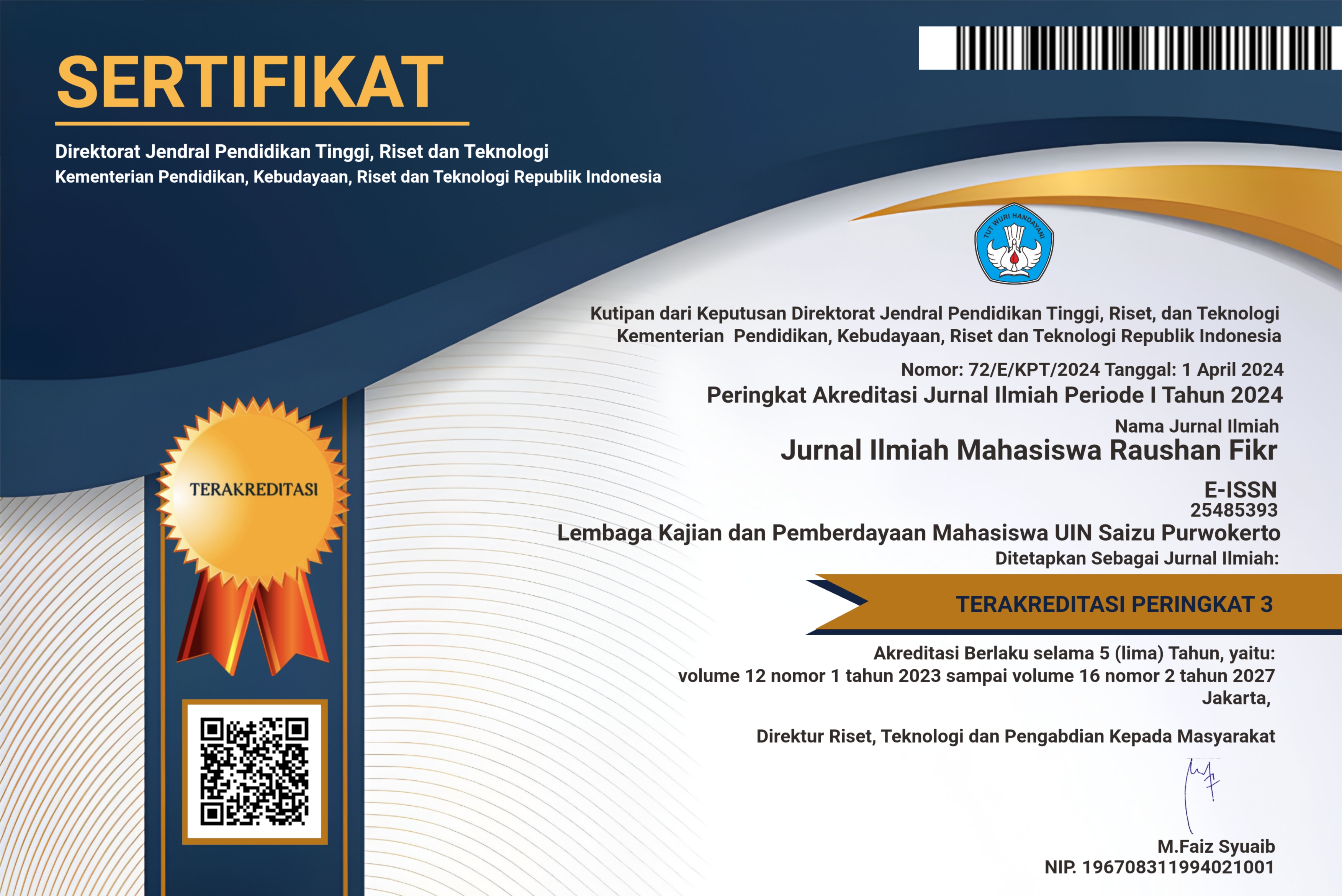The Role of Worship Values in Enhancing the Efficiency of Islamic Commercial Banks: A Data Envelopment Analysis (DEA) Approach
DOI:
https://doi.org/10.24090/jimrf.v13i1.11252Keywords:
Efficiency, Data Envelopment Analysis (DEA), Islamic Commercial Banks, Islamic ValuesAbstract
This study investigates the efficiency of Islamic banking in Indonesia from 2018 to 2021 through the application of Data Envelopment Analysis (DEA), incorporating Islamic principles. The analysis utilizes secondary financial data from four Islamic banks, sourced from the Financial Services Authority (OJK) and other researchers. The input variables considered include third-party funds allocated for profit-sharing and labor costs, while the output variables consist of revenue derived from the management of public funds and other operational income. The DEA results indicate fluctuating efficiency levels among the Islamic banks, with Bank Syariah Y consistently achieving 100% efficiency, signifying its status as the most efficient institution. The study identifies that revenue from public fund management negatively impacts the growth of Islamic banks, whereas labor costs and other operational income positively influence their development. These findings highlight areas requiring improvement and the factors driving efficiency in the development of Islamic banking in Indonesia.Downloads
References
Alhamdi, Ridha, Saparuddin Siregar, and Sugiyanto Sugiyanto. 2022. “Optimization of Sharia Bank Cuan in The Industrial Era 4.0.” International Journal of Educational Review Vol. 02, no. March (March): 311–20. https://doi.org/10.54443/ijerlas.v2i2.234
Aramonte, Sirio, Andreas Schrimpf, and Hyun Song Shin. 2021. “Non-Bank Financial Intermediaries and Financial Stability.” www.bis.org.
Aslam, Ejaz, Muhammad Saleem Ashraf, and Anam Iqbal. 2022. “Impact of Corporate Image on Customer Loyalty of Islamic Banks: The Role of Religiosity, Collectivism, Sight Cues and CSR.” Journal of Islamic Marketing, March (March). https://doi.org/10.1108/JIMA-09-2021-0314.
Auer, Raphael, Jon Frost, Leonardo Gambacorta, Cyril Monnet, Tara Rice, and Hyun Song Shin. 2022. “Central Bank Digital Currencies: Motives, Economic Implications, and the Research Frontier.” Annual Review of Economics. Annual Reviews Inc. https://doi.org/10.1146/annurev-economics-051420-020324.
Aziz, R., Hidayat, M., & Salsabila, F. 2023. Does Financial Technology Increase The Efficiency of Zakat Management Organizations or Other Factors?. Equilibrium: Jurnal Ekonomi Syariah, 11(2), 421-448. doi: http://dx.doi.org/10.21043/equilibrium.v11i2.22616
Boone, Christophe, Serden Özcan, and Jia Li. 2022. “How Are Competing Logics Combined in Managerial Teams? The Impact of Branch Founding Team Hybridity on the Growth of Islamic Bank Branches in Turkey, 2002–19.” Journal of Management Studies 59, no. 6 (September): 1460–92. https://doi.org/10.1111/joms.12788.
Endri, Endri, Naning Fatmawatie, Sugianto Sugianto, Humairoh Humairoh, Mohammad Annas, and Arjuna Wiwaha. 2022. “Determinants of Efficiency of Indonesian Islamic Rural Banks.” Decision Science Letters 11: 391–98. https://doi.org/10.5267/dsl.2022.8.002.
Furqani, Hafas. 2021. “Islamic Economics: Is It a Doctrine or A Science?” Jurnal Ekonomi Malaysia 55, no. 2: 137–44. https://doi.org/10.17576/JEM-2021-5502-11.
Habanyati, Honesty. 2022. “Lived Experiences of Multi-Banked Bank Account Holders with a Focus on Banks at Manda Hill Mall Lusaka, Zambia.” Lusaka: The University of Zambia.
Hidayat, M. Fahmi. 2022. Analisis Efisiensi Organisasi Pengelola Zakat (OPZ) di Indonesia dengan Pendekatan Data Envelopment Analysis (DEA): Studi 4 OPZ Berbasis Teknologi Finansial (Undergraduate Thesis, Uin Sunan Kalijaga Yogyakarta).
Jamal, Maysoon A., Ihab A. El-Khodary, and Doaa S. Ali. 2021. “Developing a Two-Stage Data Envelopment Analysis Model Handling Rough Variables.” In 2021 International Conference on Data Analytics for Business and Industry (ICDABI), 306–14. IEEE. https://doi.org/10.1109/ICDABI53623.2021.9655925.
Kumari, Sudesh, Vibhash Kumar, Ajay Kumar Singh, and Bhavana Singh. 2022. “Spirituality at Work and Job Performance: An Empirical Assessment of the Serial Mediation Modelling of Attitudinal Outcomes.” Purushartha 15, no. 1 (November): 94–109. https://doi.org/10.21844/16202115107.
Law, Siong Hook, and Masagus M. Ridhwan. 2022. “Effect of Islamic Financial System Stability on Economic Performance in Indonesia.” Journal of Islamic Monetary Economics and Finance 8, no. 3: 371–406. https://doi.org/10.21098/jimf.v8i3.1567.
Mia, Mohammed Mamun, Nurul Mohammad Zayed, Khan Mohammad Anwarul Islam, Vitalii Nitsenko, Tetiana Matusevych, and Iryna Mordous. 2022. “The Strategy of Factors Influencing Learning Satisfaction Explored by First and Second-Order Structural Equation Modeling (SEM).” Inventions 7, no. 3 (September). https://doi.org/10.3390/inventions7030059.
Najib, M Iqbal Aenun, and Deden Dinar Iskandar. 2022. “Efficiency Analysis of Sharia Commercial Banks (BUS) in Indonesia During 2015 – 2019.” Journal of Islamic Economics Lariba 8, no. 1 (July): 33–51. https://doi.org/10.20885/jielariba.vol8.iss1.art3.
Nugraha, Krisna, Muhtosim Arief, Sri Bramantoro Abdinagoro, and Pantri Heriyati. 2022. “Factors Influencing Bank Customers’ Orientations toward Islamic Banks: Indonesian Banking Perspective.” Sustainability (Switzerland) 14, no. 19 (October). https://doi.org/10.3390/su141912506.
Parsa, Mirwais. 2022. “Efficiency and Stability of Islamic vs. Conventional Banking Models: A Meta Frontier Analysis.” Journal of Sustainable Finance & Investment 12, no. 3 (July): 849–69. https://doi.org/10.1080/20430795.2020.1803665.
Quang Trinh, Vu. 2022. “Dual Banking System: Conventional and Islamic Banks.” in, 43–62. https://doi.org/10.1007/978-3-030-89228-9_4.
Raditya, Yohanes Amadeus, and Buddi Wibowo. 2021. “The Efficiency and Stability of the Islamic-Banking Industry in Indonesia, Malaysia, and the Middle-East.” Advances in Economics, Business and Management Research 653.
Rostamzadeh, Reza, Omid Akbarian, Audrius Banaitis, and Zeynab Soltani. 2021. “Application of DEA in Benchmarking: A Systematic Literature Review from 2003–2020.” Technological and Economic Development of Economy 27, no. 1 (January): 175–222. https://doi.org/10.3846/tede.2021.13406.
Sasongko, Hendro. 2022. “Determinants and Alternative Strategies in Improving the Financial Performance of Sharia Commercial Banks in Indonesia.” Jurnal Manajemen Dan Agribisnis, July (July). https://doi.org/10.17358/jma.19.2.307.
Sidaoui, Mouwafac, Faten ben Bouheni, Zandanbal Arslankhuyag, and Samuele Mian. 2022. “Fintech and Islamic Banking Growth: New Evidence.” The Journal of Risk Finance 23, no. 5 (October): 535–57. https://doi.org/10.1108/JRF-03-2022-0049.
Ur Rehman, Aziz, Ejaz Aslam, and Anam Iqbal. 2022. “Intellectual Capital Efficiency and Bank Performance: Evidence from Islamic Banks.” Borsa Istanbul Review 22, no. 1 (January): 113–21. https://doi.org/10.1016/j.bir.2021.02.004.
Warsito, Chandra, Iin Solikhin, Nida Umi Farhah, and Dhika Dzulkarnain Wibisono. 2022. “The Influence of Sharia Banks’ Corporate Image and Sharia Service Standardization on The Intention to Recommend to Others: The Mediating Role of Customer Satisfaction.” International Journal of Management and Sustainability 11, no. 3 (July): 115–30. https://doi.org/10.18488/11.v11i3.3085.
Yuliani, Fenny Dewi, and Annisa Fithria. 2022. “The Effect of Implementing Good Corporate Governance on the Profitability and Financing Risk of Sharia Commercial Banks.” Ekonomika Syariah: Journal of Economic Studies 6, no. 1 (July): 01. https://doi.org/10.30983/es.v6i1.4863.
Zaman, Asad. 2021. “Islamic Alternatives to The Secular Morality Embedded in Modern Economics.” Journal of King Abdulaziz University, Islamic Economics 34, no. 2 (July): 83–100. https://doi.org/10.4197/Islec.34-2.5.
Zhong, Kaiyang, Chenglin Li, and Qing Wang. 2021. “Evaluation of Bank Innovation Efficiency with Data Envelopment Analysis: From the Perspective of Uncovering the Black Box between Input and Output.” Mathematics 9, no. 24 (December). https://doi.org/10.3390/math9243318
Downloads
Published
How to Cite
Issue
Section
License
Copyright (c) 2024 M. Fahmi Hidayat, Roikhan M. Aziz

This work is licensed under a Creative Commons Attribution-NonCommercial-ShareAlike 4.0 International License.
Authors who publish with this journal agree to the following terms:
- Authors retain copyright and grant the journal right of first publication with the work simultaneously licensed under a Creative Commons Attribution-NonCommercial-ShareAlike 4.0 International License that allows others to share the work with an acknowledgement of the work's authorship and initial publication in this journal.
- Authors are able to enter into separate, additional contractual arrangements for the non-exclusive distribution of the journal's published version of the work (e.g., post it to an institutional repository or publish it in a book), with an acknowledgement of its initial publication in this journal.
- Authors are permitted and encouraged to post their work online (e.g., in institutional repositories or on their website) prior to and during the submission process, as it can lead to productive exchanges, as well as earlier and greater citation of published work (See The Effect of Open Access).
















